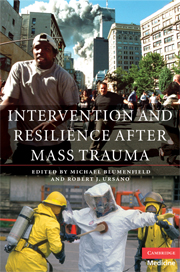Book contents
- Frontmatter
- Contents
- List of contributors
- Foreword by Joseph T. English
- Preface
- 1 Systems, science, and populations: Effective early mental health intervention following mass trauma: the roles of government, clinicians, and communities
- 2 Factors in the development of community resilience to disasters
- 3 Psychological first aid
- 4 Acute stress disorder and early interventions after trauma
- 5 The role of pharmacotherapy in early interventions
- 6 Should culture considerations influence early intervention?
- 7 Resilience is the default: how not to miss it
- 8 Epilog: Early intervention for individuals and communities: planning for the future while meeting present needs
- Index
Foreword by Joseph T. English
- Frontmatter
- Contents
- List of contributors
- Foreword by Joseph T. English
- Preface
- 1 Systems, science, and populations: Effective early mental health intervention following mass trauma: the roles of government, clinicians, and communities
- 2 Factors in the development of community resilience to disasters
- 3 Psychological first aid
- 4 Acute stress disorder and early interventions after trauma
- 5 The role of pharmacotherapy in early interventions
- 6 Should culture considerations influence early intervention?
- 7 Resilience is the default: how not to miss it
- 8 Epilog: Early intervention for individuals and communities: planning for the future while meeting present needs
- Index
Summary
American psychiatry has been a leader in addressing the psychological sequelae of trauma no matter what the etiology may be. Erich Lindemann working at Massachusetts General Hospital in 1943, when confronted with survivors of the Boston Grove Fire, was able to recognize and define the psychological symptoms, which became a model for many years. It was only fitting that more recently when the Committee on Dimensions of Disaster of the American Psychiatric Association (APA) chaired by Dr Ursano, co-editor of this book, recognized the need for financial support for local psychiatrists at the time of disaster, they named a proposed grant that would be given to local District Branches in such circumstances: the Lindemann Grant. The co-editor of this book, Dr Blumenfield, introduced this proposed resolution to the Assembly of the APA which enthusiastically endorsed it, making funds available whenever needed.
Unfortunately, there have been numerous tragic events, such as Katrina and September 11, 2001, which have required psychiatrists to mobilize and to offer assistance together with other emergency workers. Disasters and mass trauma have certainly not been limited to the United States. Earthquakes, tsunamis, terrorist bombings and war itself can occur anywhere on our globe.
The resultant trauma impinges on the human psyche and presents a challenge for all the healing professions. The tradition of modern psychiatry in these circumstances brings compassion, empathy and what we know about how to help in these circumstances.
- Type
- Chapter
- Information
- Intervention and Resilience after Mass Trauma , pp. xiii - xivPublisher: Cambridge University PressPrint publication year: 2000



